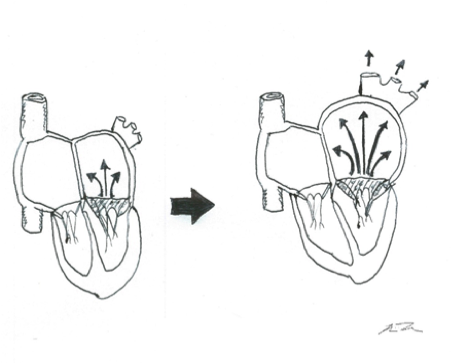What is degenerative valve disease?
Chronic degenerative valve disease (CVD) is an age-related thickening of the heart valves that occurs most often in small breed dogs. CVD most commonly affects the mitral valve (on the left side of the heart) but can affect any valve in the heart.
The mitral valve separates the left atrium (filling chamber) from the left ventricle (pumping chamber). In a normal dog, the thin mitral valve makes a tight seal every time the heart beats, preventing any backflow of blood from the left ventricle to the left atrium. With CVD, the thickened mitral valve cannot close properly and leaks blood backwards.
How does CVD affect my dog and what treatments are available?
Leaks in heart valves cause heart murmurs which are detected when ausculting your pet’s chest with a stethoscope. Small leaks may have no impact on your dog’s life, but bigger leaks can cause heart enlargement and ultimately fluid build-up in the lungs or belly (congestive heart failure).
No therapy has been proven to slow or prevent progression of mild CVD. With moderate to severe CVD, medication may help delay progression to congestive heart failure, therefore periodic recheck appointments are recommended to determine if and when treatment is necessary.
In human patients, repair of the mitral valve is a common surgical procedure. This may be an option for select canine patients with severe CVD, but this is a high risk procedure that should be given very careful consideration on an individual basis.
What should I monitor at home?
It is important to become familiar with your pet’s normal sleeping respiratory rate. Often, the first indication of development of heart failure is an increase in the breathing rate when sleeping, and early detection of heart failure can help avoid a hospital stay. Your pet’s respiratory rate should be less than 40 breaths per minute when sleeping. However, any consistent or progressive elevation from your pet’s baseline rate should be cause to alert a veterinarian. There are several free iPhone applications (ex. Cardalis) which can help keep track of respiratory rates.
You should also monitor for cough, lethargy, fainting, or decreased appetite, and contact a veterinarian with any concerns.

We use technologies like cookies to store and/or access device information. Consenting to these technologies will allow us to process data such as browsing behavior or unique IDs on this site. Not consenting or withdrawing consent, may affect some features and functions of this site.
